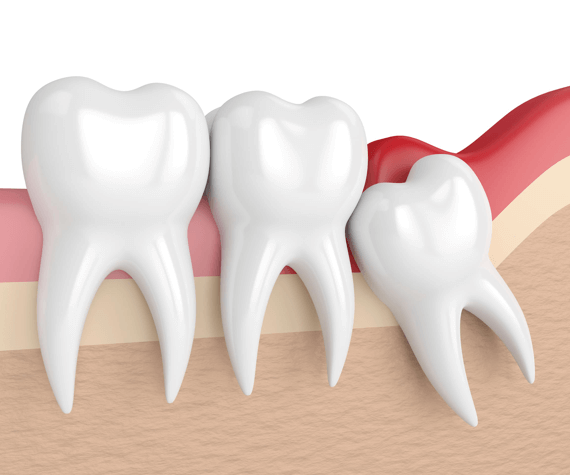
Q. Why are they called wisdom teeth?
A. Wisdom teeth are the third and last molars on each side of both jaws. They are the last permanent teeth to come in and this usually happens when you are older and ‘wiser’!
Q. What age do wisdom teeth come in?
A. The average age that people get their wisdom teeth is between 17 and 25 years old. Obviously though everyone is different and they can come through earlier or later – even as late as in your 40’s. And its not necessarily a given that you will get four wisdom teeth either, as some people have less, none or occasionally even more.
Q. Why do wisdom teeth have to be removed?
A. Again, everyone is different and therefore not everyone has to have their wisdom teeth removed. The problem with wisdom teeth is that they are the teeth most likely to be stuck, or impacted, because of a lack of space for them to come through. This means they can cause overcrowding and misalignment, damage the molar next to them or create a pocket for bacteria. These are all good reasons to have them removed to protect the health of the rest of your teeth and keep your smile straight. However, some lucky people do have enough space for their wisdom teeth to come through without causing any issues and therefore there is no cause to remove them.
Q. How painful is wisdom tooth removal?
A. The method of removing a wisdom tooth depends on your circumstances. Sometimes a fully or partially erupted tooth can be removed via a simple extraction which is quicker, easier and less invasive. But in other cases oral surgery may be necessary. In all cases local anaesthetic is applied to effectively numb the gum to ensure you are totally pain-free. Dental sedation may also be an option to keep you calm and comfortable, especially if you suffer from dental anxiety. You are likely to need over-the-counter painkillers for a day or two to stay comfortable. Our post-treatment care will also include warm salt water rinses, cold packs for swelling, taking care to avoid hot foods and drinks, and a couple of days’ rest. Most of our patients find that they have minor pain and discomfort for 2-3 days which is easily managed with painkillers. For those who have put up with a painful and troublesome wisdom tooth for some time, removal can be a big relief.
Q. What happens if you don’t remove your wisdom teeth?
A. Unfortunately, people who have wisdom teeth emerging and aligning without any problems are the minority. In the majority of cases these molars come in crooked and/or don’t break fully through the gum. Overcrowding and misalignment can lead to a crooked smile as well as leave you more prone to tooth decay because misaligned teeth are harder to keep clean (because of food traps and hard-to-reach bacteria pockets). Partially erupted teeth can lead to bacterial infections or even cysts which can damage bone and gum tissue. Often there is also pain or tenderness, swelling and sometimes an unpleasant taste in your mouth.
If you have any questions or concerns about your wisdom teeth please contact us. We can assess where your wisdom teeth are at and monitor their growth and emergence before any troublesome symptoms develop.